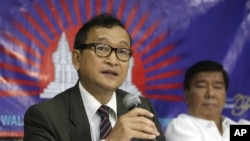PHNOM PENH & WASHINGTON DC - The Cambodia National Rescue Party inaugurated its headquarters in Phnom Penh on Tuesday, setting the stage for the new opposition to begin preparations in earnest for 2013 national elections.
Speaking via Skype from Manila, Sam Rainsy, the head of the party, said the new headquarters signaled “hope for change in the near future.”
The new party will merge members of the Sam Rainsy and Human Rights parties, but leaders say they hope it will also draw new supporters when the country votes for parliamentary representatives in July 2013.
Sam Rainsy told his supporters Tuesday that a united opposition would mean victory in the election. “When one faces one, there will be change,” he said. “In every country in the world, when democrats unite, the democrats win over the dictators.”
Officials of the ruling Cambodian People’s Party have said they are not concerned with a new, united opposition. But Kem Sokha, vice president of the new party, said the renewed opposition will make for “a marvelous competition” at the polls.
Sam Rainsy is in Manila to meet with Philippines senator Franklin Drilon, who is helping him launch an international parliamentary committee to push for free and fair elections in Cambodia next year.
Sam Rainsy, who faces up to 10 years in prison on charges if he returns, told VOA Khmer by phone that the Philippines senator would help push for his return to Cambodia ahead of the elections. Sam Rainsy is currently ineligible to compete in elections and lives in exile abroad.
“If I can’t participate and they prevent me, then the international community will warn the current government that such an election cannot be accepted,” he said.
The International Parliamentary Committee for Democratic Elections in Cambodia will follow the recommendations of the UN”s special rights envoy to Cambodia, Surya Subedi, who is also pushing for free and fair elections next year, Sam Rainsy said.
“So, what the IPCDEC demands is [that the government] follow the recommendations of the UN, not to follow the recommendations of the parties at all,” he said.
The international community has an obligation to move democracy forward in Cambodia, he said. “But what we’ve seen in the past few years is that it is not going ahead,” he said. “It went backwards.”
Speaking via Skype from Manila, Sam Rainsy, the head of the party, said the new headquarters signaled “hope for change in the near future.”
The new party will merge members of the Sam Rainsy and Human Rights parties, but leaders say they hope it will also draw new supporters when the country votes for parliamentary representatives in July 2013.
Sam Rainsy told his supporters Tuesday that a united opposition would mean victory in the election. “When one faces one, there will be change,” he said. “In every country in the world, when democrats unite, the democrats win over the dictators.”
Officials of the ruling Cambodian People’s Party have said they are not concerned with a new, united opposition. But Kem Sokha, vice president of the new party, said the renewed opposition will make for “a marvelous competition” at the polls.
Sam Rainsy is in Manila to meet with Philippines senator Franklin Drilon, who is helping him launch an international parliamentary committee to push for free and fair elections in Cambodia next year.
Sam Rainsy, who faces up to 10 years in prison on charges if he returns, told VOA Khmer by phone that the Philippines senator would help push for his return to Cambodia ahead of the elections. Sam Rainsy is currently ineligible to compete in elections and lives in exile abroad.
“If I can’t participate and they prevent me, then the international community will warn the current government that such an election cannot be accepted,” he said.
The International Parliamentary Committee for Democratic Elections in Cambodia will follow the recommendations of the UN”s special rights envoy to Cambodia, Surya Subedi, who is also pushing for free and fair elections next year, Sam Rainsy said.
“So, what the IPCDEC demands is [that the government] follow the recommendations of the UN, not to follow the recommendations of the parties at all,” he said.
The international community has an obligation to move democracy forward in Cambodia, he said. “But what we’ve seen in the past few years is that it is not going ahead,” he said. “It went backwards.”







